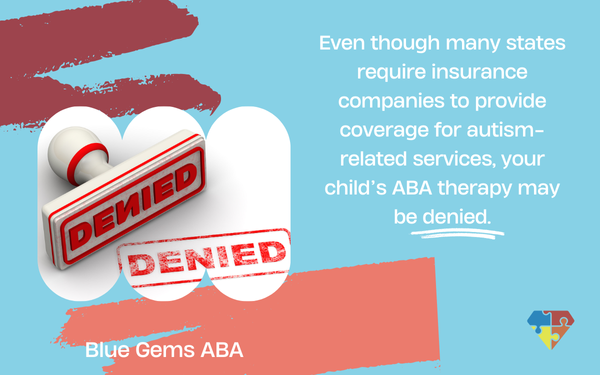When Insurance Denies ABA Coverage: What to Do
If your child has been diagnosed with autism spectrum disorder (ASD), they are likely to benefit greatly from applied behavior analysis (ABA therapy). As a science-based approach to learning, ABA therapy can help children on the autism spectrum learn new skills and modify certain behaviors.
ABA therapy is quite intensive, typically requiring multiple sessions per week for multiple hours per day. This can create quite the financial burden on families who have children with autism if they aren’t able to get insurance coverage.
Luckily, many states require insurance companies to cover autism-related services such as ABA therapy. That being said, there are times when your child’s ABA therapy may be denied by insurance.
So, what can you do if insurance denies ABA coverage? We cover this topic in more detail below.
Table Of Contents
Common Reasons Why Insurance Denies ABA Therapy Coverage
Even though many states require insurance companies to provide coverage for autism-related services, your child’s ABA therapy may be denied.

One of the most common reasons this happens is due to a coding error.
There is a lot of paperwork and data entry that goes on in the background at healthcare providers and insurance companies, which rely on certain codes to determine claim approvals.
If someone didn’t code your child’s diagnosis properly, for example, the insurance company may automatically deny it. That’s why accurate coding is essential to getting ABA therapy approved.
Typically speaking, most insurance companies require that ABA therapy be a “medically necessary” treatment for your child to approve it. Should they determine that there is no medical necessity, they could deny the treatment.
Another common reason insurance denies ABA therapy is if there are errors in documentation. This could be that some information contained in the documents is incorrect or simply missing.
Finally, while many states require insurance companies to provide coverage for autism-related services, there are exceptions and limitations. It’s possible, then, that your child’s ABA therapy could be denied should your specific insurance plan have exceptions or if their therapy would exceed your plan’s limits.
| Reason for Denial | What to Do |
|---|---|
| Coding Error | Review diagnosis codes and ask provider to resubmit claim. |
| Lack of Medical Necessity | Provide supporting documents from healthcare providers. |
| Documentation Errors | Correct missing/inaccurate info; resubmit complete forms. |
| Plan Exceptions or Therapy Limits Exceeded | Review policy details; consider appeal with added support. |
Can Insurance Denials Be Fixed?
The good news is that it’s still possible to have your child’s ABA therapy covered by insurance even if you receive an initial denial. Make sure to thoroughly review the insurance company’s denial letter so you can understand why they made the decision.

This information, which they are required to provide to you, will help you to create a plan for how you can rectify the situation and/or appeal the decision.
The denial letter should provide you with detailed instructions on how you can file an appeal. It’s important that you follow those instructions and meet whatever deadlines are set so that you still have a chance to have your child’s ABA therapy approved.
What specific action you take at this point depends on the reason for the denial. No matter what the reason, though, you’ll likely need to gather a lot of documentation and work hand-in-hand with your child’s healthcare team and ABA therapy team.
As you collect this information and plan to file your appeal, make sure to keep detailed records and copies of everything from your providers as well as the insurance company. This will ensure that you are well-prepared and can support whatever information they ask from you.
| Step | Action | Notes |
|---|---|---|
| 1 | Review denial letter carefully | Identify exact reason(s) for denial. |
| 2 | Gather supporting documentation | Include diagnosis, treatment plan, and provider statements. |
| 3 | Follow appeal instructions provided by insurer | Meet all deadlines listed. |
| 4 | Maintain records of all communications and submissions | Helps if further appeals are needed. |
| 5 | Work with ABA provider and healthcare team throughout the process | Their help is critical in building a strong case. |
Is It Hard to Prove ABA Therapy is Medically Necessary?
Other than clerical errors, medical necessity is usually the leading reason why ABA therapy is denied. Since the treatment is intensive and, as a result, expensive, insurance companies want to make sure it’s really necessary before they approve it.
Your child’s healthcare and ABA therapy team will provide you with the documentation you need to prove that it’s medically necessary. In addition to copies of the formal ASD diagnosis, you may need to provide documentation that details the specific challenges and behaviors that your child faces, as well as the goals that their ABA therapy is designed to address.
It’s often powerful to have statements and letters from your child’s healthcare providers that emphasize how beneficial ABA therapy can be for your child, and what developmental outcomes should be expected.
By providing supporting documentation such as this, you’ll have a better chance of having your child’s ABA therapy approved.
Blue Gems ABA Works with Most Insurance Companies
It can be scary when insurance companies deny your child’s ABA therapy coverage. If this happens to you, realize that you still have options to rectify the situation.
At Blue Gems ABA, we accept most insurances and have many years of experience working to get ABA therapy covered by insurance plans. In addition to providing ABA therapy treatment services directly to children with autism, we also conduct autism evaluations and can diagnose ASD when appropriate.
To learn more, please contact us today.




